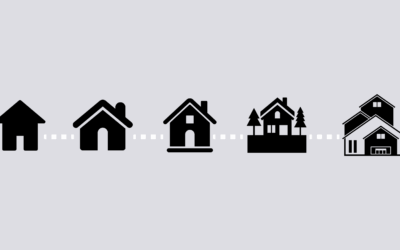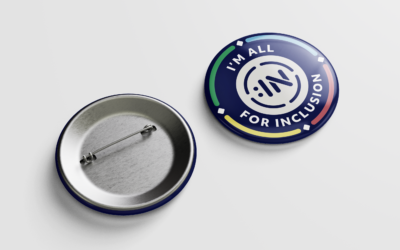This interview is part of our Diversity in Tech series in partnership with All Raise, Anitab.org, Blavity, Grid 110, and Latinas in Tech, a coalition effort to champion diverse representation in the tech industry. Read more about this initiative here, and download images from the Diversity in Tech collection here.
Mica Alaniz is a Senior Software Engineer at the DNC, where she builds tools to support all Democratic candidates and their data needs, as well as grassroots organizing and voter empowerment efforts. In her spare time, she teaches workshops for under indexed individuals in tech on Git, Leadership in the Remote Workplace, Employee Rights in Tech and other topics. She is also a co-organizer for PromptConf Chicago, a 2020 Code2040 Fellows Program Mentor and a frequent conference speaker and mentor to fellow people of color in technology.
Mica is fresh off the Latinas in Engineering panel for Techqueria’s #LHM Summit and her keynote for the inaugural edition of OctogatosConf (a trilingual conference by Github), where she spoke about her journey to the DNC and how volunteering can kickstart career goals.
We caught up with Mica to learn more about her work at the DNC, her thoughts on how community can influence and support a more inclusive tech industry, and her advice for those new to the field.
Hi Mica! Tell us about yourself, how did you get to where you are today? What sparked your interest in tech and a career in engineering?
The best place to start is to say that I’m a born and raised third-generation Chicagoan. Beyond those generations, my family is from Michoacan, Durango and San Antonio, and I identify as Chicana. I’ve lived within the same 30 mile radius my entire life and nearly my whole family is in, or near, the city of Chicago. I stayed close for college and I never felt limited in any opportunities — since I believe Chicago is truly the best city in the world. So much of who I am I owe to being from Chicago, even where I am today — my values, politics, and my focus on community and my family — and especially my dad, a now-retired City of Chicago employee and a longtime member of SEIU who always emphasized the importance of voting and being an informed citizen.
Another constant in my life was that growing up there was always a computer in the house that was available for me to play with, even as a kid. My mom worked for Illinois Bell and would bring home the computers that the office would replace every year. I spent more than a few school vacations inside on the computer and by high school I had a facility with technology that most people my age didn’t have access to.
Despite this — and like a lot of under-indexed folks in the industry — I didn’t have a straightforward path to tech. I have a liberal arts background and spent some time post-undergrad figuring out what exactly it was that I wanted to do as my career. I waited tables, worked retail, became a nightlife promoter and event producer, and thought for a long time about going to business school.
I didn’t know right away that I wanted to be a software engineer, but eventually I found that I did want to work in tech. I went into grad school thinking I was going to get a degree that would get my foot in the door through design or strategy; bootcamps didn’t really exist yet and I hoped the credentials from a Master’s would make me a better candidate. Although my first internships and jobs were in digital marketing and advertising, I ended up having the opportunity to do some coding for work.
It was during those early jobs that I realized the days that flew by — the days where I would look up and it was suddenly 5 p.m. — were the days I was coding. From there, I decided to try to find a developer role where I could code all the time and I have basically learned on the job since then. I’ve certainly had setbacks; a career path, like any path, contains bumps and obstacles along the way, but I never let that deter me from finding ways to keep learning and bring value to my team.
In 2017, I started volunteering my professional skills for causes I believed in, and when I got involved with a political candidate here in Illinois, I fell in love with the work. So much of what I learned while volunteering — on that campaign and for other organizations — is what I do in my current work. I think it’s so important to emphasize how much learning on the job (learning while doing) should be expected at any level or role in tech.
You’re a Senior Software Engineer for the Democratic National Committee, working at the intersection of politics and technology — what does a day on the job look like for you?
The DNC Tech Team is a fully distributed team and hires fully remote, which means I have colleagues in over 20 states and in four time zones! This is actually my first remote job, and when I started in 2017, my first hurdle was learning what that meant for my day-to-day. I found a great co-working space — Second Shift in Chicago’s Logan Square neighborhood — and with it, a great community. I really credit my first two successful years in this role to keeping that aspect of my routine the same. I started working from home after a move in February of this year — which coincided with much of the industry doing the same due to COVID — and I’ve been lucky enough that my day-to-day hasn’t changed too much. I’ve since helped others transition into their new remote work lives.
I’m a Lead Engineer on the Voting Services team, and I like to say our team works on a little bit of everything. From week to week, we could be working on design, front-end or back-end code, a data pipeline, the infrastructure that our apps are built on, or architecting and planning the next big feature.
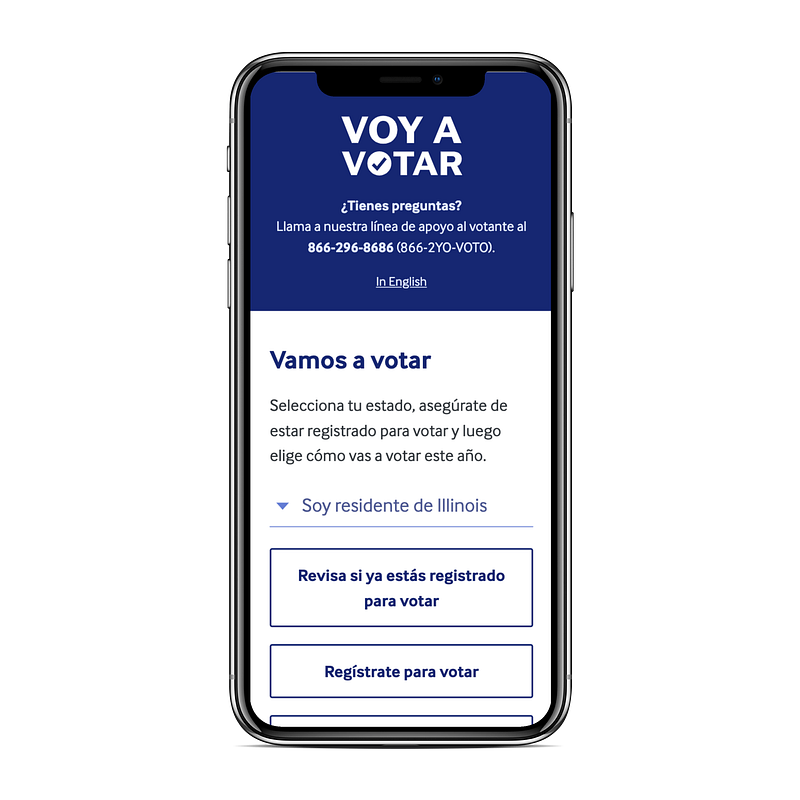
One of our main products is the app IWillVote.com and its companion site VoyAVotar.com. We use these apps to drive voter engagement, empowerment, and education through a Mail Ballot Dropoff / In Person Polling Place Locator, information on important dates and deadlines, and by assisting voters in registering to vote and applying to vote by mail. I Will Vote and Voy a Votar become the centerpiece of a lot of voter outreach in an election year; especially in one where it’s so important to help people easily and quickly find information about voting in their state. The services and data these apps need to run also power other initiatives and programs within the DNC: Voter Protection, Data and Organizing, and even some of our direct communication to voters (such as email and SMS programs) rely on our Voting Location data and Polling Place API.
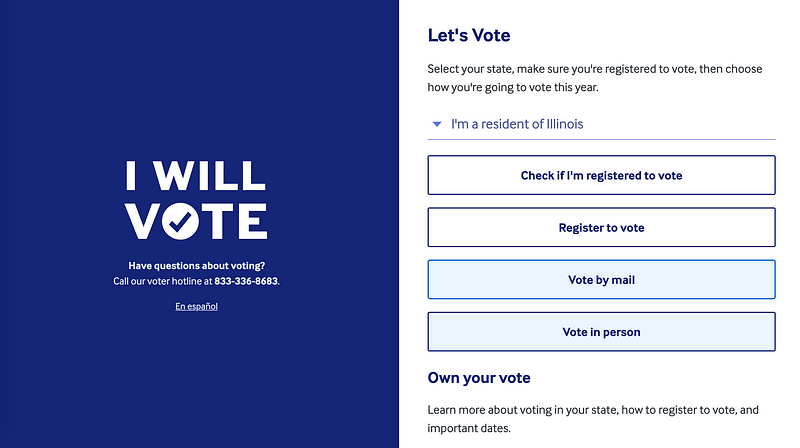
What are some opportunities you see right now to drive meaningful change when it comes to more equitable representation in tech and how does community help drive change?
I’m a firm believer in holding open doors for others that were once closed for me. When you’re in a place where you don’t see a lot of people like you, you can’t be blamed for wondering if you belong. But I cannot imagine a better way to improve the representation in tech than for people like me, who have had to work with and through that uncertainty, to reach out to those who are new to the industry and share what we’ve learned with them. It could be as simple as a reminder that they’re not on their own if they need some help, and can eventually become a more involved and beneficial mentorship relationship.
I definitely struggled when I began my career. It’s important to talk about these challenges so people know what to expect and how to identify what problems and support both look like. I know how it feels to wonder if you’re on your own, and to not know if there is anyone around who you could talk to about the questions you have. Having a bit more support from a community and visibility from others like me earlier in my career would have been a game-changer for me as a young person in tech, and participating in that community now has been incredibly fulfilling.
Community factors a great deal into driving a real change toward equitability, and I think one of the best ways to foster that community — even if it’s just in our workplaces — is through visible representatives and leaders. This is part of why I love being able to speak at conferences and events as well. The topics I speak about can range from a technical problem to career development to a q&a about working in political tech. But no matter what I’m speaking about, I always try to focus the talks I give on my personal story. I hope to help others like me see themselves in that story and beyond that, as members of a community and of my community.
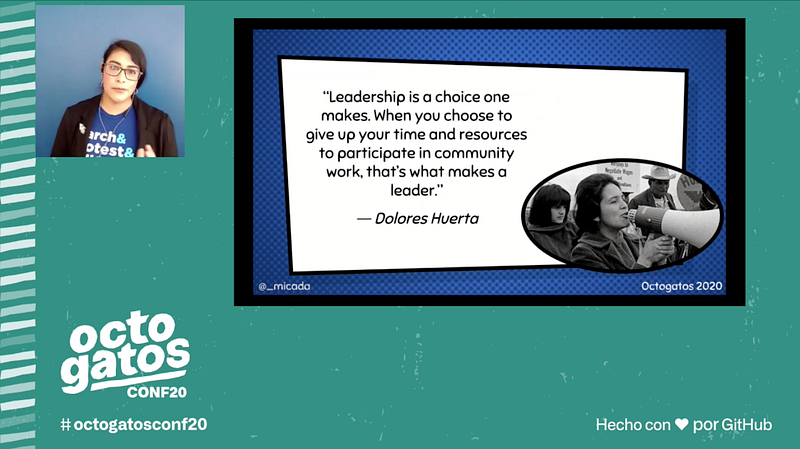
Organizations like Code2040, Techqueria, Latinas in Tech, People of Color Code, and others are always great places to connect, mentor, answer questions, attend events, and be available for opportunities for yourself, to assist others on their career paths and even both(!) by opening the door for someone to join your team. I can attest that once you can find and grow that supportive community, it makes a world of difference in your perspective and ability to handle future challenges.
At Noun Project, we believe visual language has the power to shape, reinforce and change perceptions. What are your thoughts on why diverse visual representation in tech is so important to helping change the status quo in the industry?
An engineer can look like anyone at all. But, when images or portrayals of engineering don’t reflect that reality, it causes harm — those images will be internalized and discourage people from joining the field before they’ve even started.
It really matters that people see someone like themselves in these roles, demonstrating expertise or leadership before they understand that’s a possibility for them too. If we want more individuals with under-indexed identities to consider a career in tech (and maybe even in political tech!), it’s up to those of us with the power to make change and be visible to show that there is a place for them.
On DNC Tech, we recognize that means making sure that our team reflects the diversity of the Democratic Party. The impact of diverse representation — visual or otherwise! — can be so consequential to individuals’ sense of belonging, and it should absolutely become the new, long-overdue normal.
Looking to the future, what inspires you and what initiatives are you most excited about right now?
I am so proud of and motivated by the work my colleagues have done in the run up to this election. The DNC really invested in the team, and we used that investment to modernize the tools and tech needed to win races up and down the ballot across the country. I’m inspired by our volunteers, the community leaders, and all the everyday people who put so much energy into this work; it gives me energy and confidence to know that I — that we together — can do hard things. As far as initiatives, I love text banking for the DNC’s own Text Out the Vote program, as well as Voto Latino and Open Progress Text & Turnout Troop.
But I can’t stress enough how much I enjoy working with the aforementioned organizations like Code2040 and Techqueria, which help industry folks like me pay forward into a new, more diverse generation of the tech workforce.
What advice would you give to people currently navigating the path to a future career in tech?
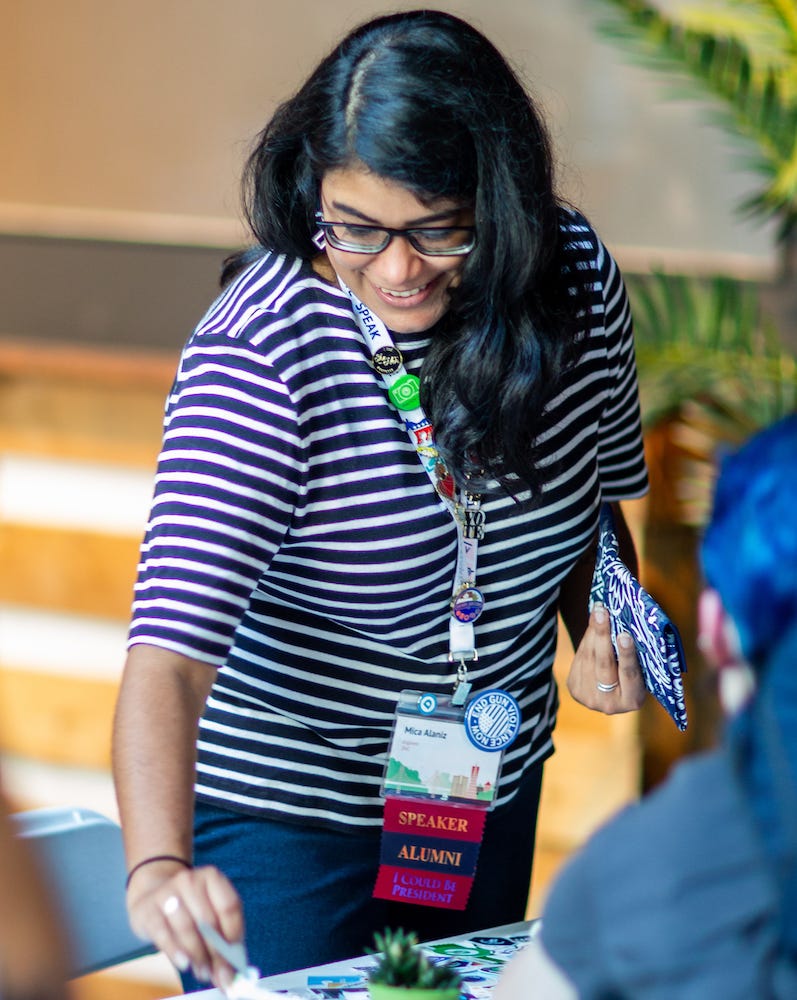
My advice to people considering a tech career, or just starting one, is to find a community where you can bring your whole identity and your authentic self — as well as your questions. Support for your whole self, wherever you are in your journey, can look like a lot of things. it could be a one-on-one relationship with a mentor or a sponsor — even a peer sponsor! — within your workplace. It could just be through friends on social media or a Slack full of people with whom you can commiserate and celebrate your successes. Support from your community can make such a difference in your ability to excel through challenges and grow as a professional.
A good mindset going into any industry — but especially tech! — really starts with the expectation that you will always be learning. Once you understand that, it becomes easier to reckon with the reality that learning is the job. And this is not necessarily just a technical skill to develop, but a good life skill as well! Reading has been as constant in my life as technology and as community engagement. I am always learning because of it and I love how much it’s helped me stay open to learning. It’s served me well no matter my role and throughout my career.
This work requires people who are determined, eager to learn, and unwilling to settle for the status quo. I am driven and excited to do my part to continue the work so many activists, leaders, and visionaries began before me. I want to keep building the groundwork on which future technologists and organizers can push for change and grow into their expertise. And all of this is of course, in the effort to fight for progress in all of our communities — yours and mine, national and local — toward a direction which aligns with our values, our selves, and our worth.
About Latinas in Tech
Latinas in Tech is a non-profit organization working to rebuild the tech industry so that Latinas are well-represented throughout all levels of the ecosystem. The group is comprised of more than 10,000 women, representing more than 23 countries, working at more than 200 of the top technology companies. The group began in Silicon Valley in 2014 and has since then expanded to ten other cities and states: Atlanta, Austin, Boston, Chicago, London, Los Angeles, Mexico City, Miami, New York City, Sacramento, Seattle, Utah, and Washington DC. Latinas in Tech focuses on 3 key pillars: professional development, recruiting, and mentorship. For more information, visit https://www.latinasintech.org.



